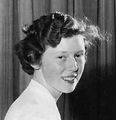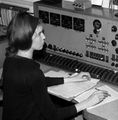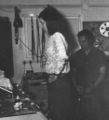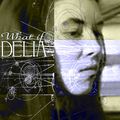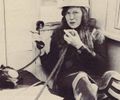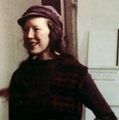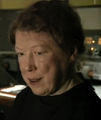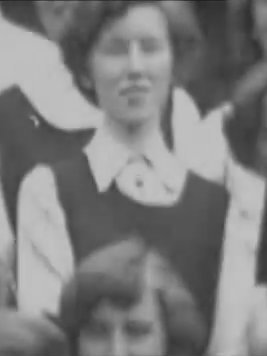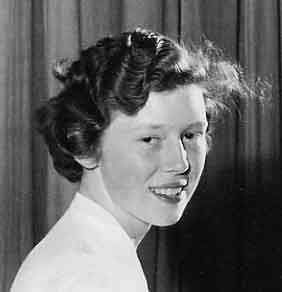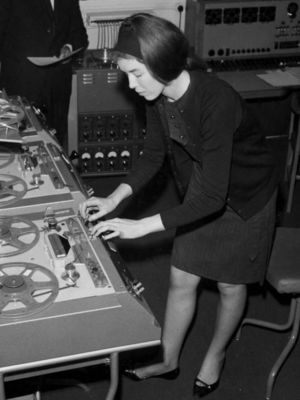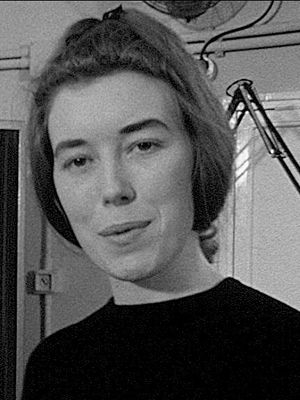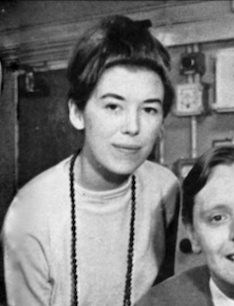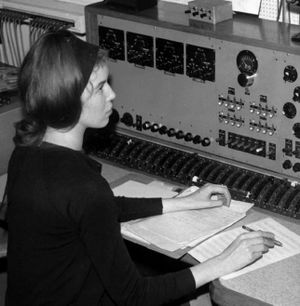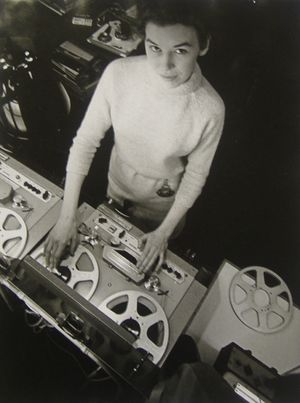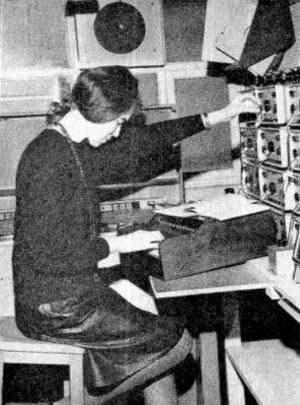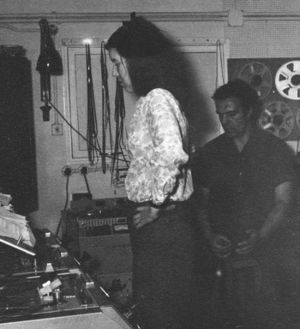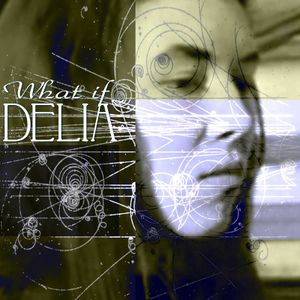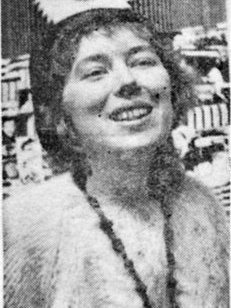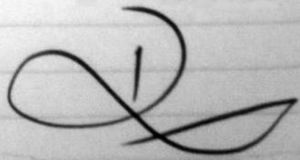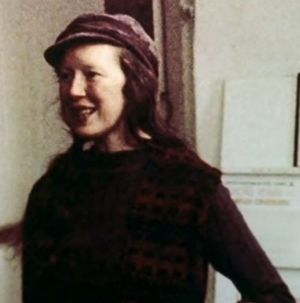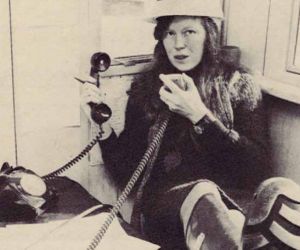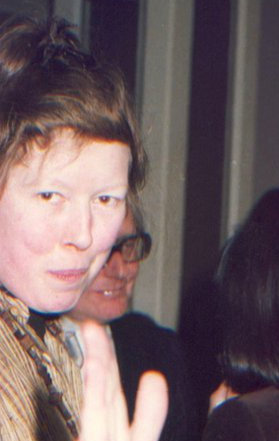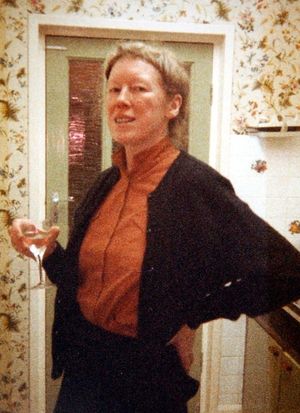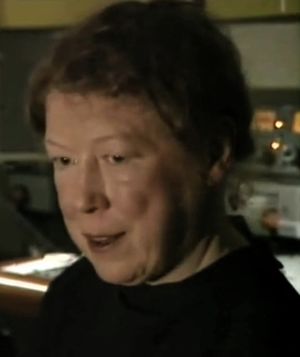Chronology
The Chronology page collects anything about Delia with a date, in order.
Contents
Photogallery
Chronology
1937-1959
Wednesday, 5th May 1937: Delia is born in Coventry[3], the daughter of Ted and Emmie Derbyshire of Cedars Avenue, Coundon, Coventry.[4]
“Radio had a very big influence over me. It was so important during the Second World War. Life was really very basic at that time and radio provided an essential escape and a greatly valued education.”[5]
17th January 1939: Delia's sister, Catherine, is born.
August 1940: The bombing of Coventry starts[6] and Delia is moved to stay with relatives in Preston, Lancashire.[7]
14 November 1940: Coventry's largest and most destructive bombing raid starts in the evening.[6]
After the worst blitz I was shifted to Preston, where my parents came from. It's only today that I've realised that the sound of clogs on cobbles must have been such a big influence on me - that percussive sound of all the mill workers going to work at six o'clock in the morning.[8]
8th/9th and 10th/11th April 1941: Coventry's second major air raid takes place on two nights apart.[6]
1941: At the age of four, she is teaching others in her class to read[9] and write.[7]
3rd August 1942: The final air raid falls on Coventry.[6]
1943: Her sister Catherine dies of peritonitis.[10]
1945: Aged 8, Delia starts playing piano,[11] Delia's parents buy her a piano and for several years she takes lessons outside school hours.[7]
1948: Delia starts at Barrs Hill School.[3]
“At school I wasn't allowed to study music. I studied mathematics, theoretical mechanics and physics. The most exciting part of physics was acoustics, although unfortunately my teacher didn't share my enthusiasm! So I was forced to teach myself. I learnt about acoustics and indulged my passion for music away from school.”[5]
1950: "At the age of thirteen she was an accomplished pianist, and played our piano faultlessly in spite of my picking out all the complicated bits I could find on the sheet music available."[12]
1951-53: Delia is Graham Harris' girlfriend, plays pianoforte well and tennis poorly. “As a teenager [she] was very talented, she was highly intelligent, she was personable, lively and witty.”[12]
6th March 1951: Delia takes a music test and scores 50/50.
8th May 1953: Delia writes the English essay Wireless Programmes, deploring the dumbing down of BBC programmes caused by them moving away from music and towards variety.
1953-54: Delia wins many piano competitions.[12]
For some time in the 1950's, Delia was part of the National Youth Orchestra[13] but we don't know when.[14]
1956: Delia leaves Barrs Hill School and goes to to Girton College, Cambridge.[3]
“I won a scholarship to Cambridge reading mathematics. That was a strange year, one third of my fellow students gave the course up and so I was given the opportunity of changing to another subject. Well I wanted to do music; to me that was a forbidden paradise. They eventually realised that I had a natural instinct for music and allowed me to enter the course.”[5]
1957: Delia switches her degree from Mathematics to Music.[3]
“There were only a few women at the University at that time and so we were treated terribly. But I had the solace of my music. The musicians hated acoustics and the theory of sound, but when we studied that I was in my element. I found myself drifting away from the syllabus to learn about mediaeval and modern music. That didn't go down too well with my tutors. They wanted me to study the period 1650 to 1900, but it bored me. So I didn't do too well there!”[5]
17-19th October 1958:[15] Delia goes with Jonathan Harvey to Expo 58 in Brussels, where they hear Varese's "Poème Eléctronique"[16] at its world première, performed on 425 speakers.[17]
December 1958: During her final year at Girton College, Delia meets Graham Harris for the last time while doing Christmas holiday work at the Post Office and they go to a dance.[12]
1959: Delia graduates with an MA in Mathematics Part 1 and Music Part 1.[3] "She was a really nice girl, but changed after she went to Cambridge."[18] "We were two different people inhabiting different planets, and a wide gulf had grown between us."[12]
“After my degree I went to the careers office. I said I was interested in sound, music and acoustics, to which they recommended a career in either deaf aids or depth sounding. So I applied for a job at Decca Records. The boss was at Lords watching cricket the day I had my appointment, but his deputy told me they didn't employ women in the recording studio.”[19]
“[After I graduated, I] went straight abroad with the Pembroke University Players doing sound effects for Julius Caesar. I had such fun, I just didn't want to come back to England!”[5]
June-September 1959: Delia starts working as a tutor in music and mathematics in Geneva for the British Consul-General and others.[3]
September-December 1959: Delia starts working at the International Telecommunications Union, United Nations, Geneva, as Assistant to Gerald G. Gross,[7] the Head of Plenipotentiary and General Administrative Radio Conferences,[3] where she works for two years, all the time bombarding the B.B.C. with applications for a job.[4] [this "two years" conflicts with Clive Blackburn's biography[20]].
1960
January-April 1960: Delia returns to Coventry and starts teaching general subjects in a primary school.[3]
May-October 1960: Delia works at Boosey & Hawkes music publishers, London as Assistant in the Promotion Dept dealing with advertising and publicity material.[3]
November 1960: Delia joins the BBC as a Programme Operations Assistant.[3]
“There was a programme called Record Review, and they just played tiny extracts from records. And one of the music critics would say, “Look, it's on this side of the LP. I don't know where it is, but it's where the trombones come in.” And I'd just hold it up to the light and see the trombones and put the needle down exactly where it was. And they thought it was magic.”[5]
1961
In 1961, Delia becomes a Studio Manager at the BBC.
“Eventually the BBC wrote to me and I went along for an interview. I impressed the interviewers and eventually became a studio manager.”[5]
“It was very exciting, especially on the music shows. All the records had to be spun in by hand and split second timing was essential. When tapes came in I used to mark them with yellow markers to ensure that one followed another and that there were no embarrassing gaps in between.”[4]
In 1961 or 1962, Delia takes up the double bass and takes lessons in Covent Garden once a week.[7]
1962
In 1962, Delia creates Arabic Science and Industry, Science Serves the Arts, Time On Our Hands, musical effects for Closed Planet, and probably Mattachin. By a strange quirk of copyright law regarding recordings made before 1963, these are now in the public domain.
“I'd heard about the Radiophonic workshop and I said "Oh, I want to go there" but I was so keen! I went there on my days off, just observing, so that's where I learned about tape manipulation.”[21]
23rd March 1962: Delia is living at 45 Kensington Gardens Square in London and writes to the British Film Institute about her membership.[22]
2nd April 1962: Enid Law, Membership Officer of the British Film Institute, replies to Delia's letter of the 23rd, returning her membership card endorsed for free associate membership.[22]
April 1962: Delia starts a three-month attachment to the BBC Radiophonic Workshop, which is to last 11 years.
“I was really happy as a studio manager until I realised that I could move to the Workshop and before I had even finished asking my boss for a transfer, he had his hand on the telephone. It turned out that I was the first person who had actually asked to go there. Previously people had been sent, usually unwillingly, for a six month attachment. I was allowed to stay longer and became the most junior person there, even though I was the most highly qualified.
I joined in 1962 and the first thing that I did was to go off and tour around our European colleagues' studios like the ORTF [Office de Radiodiffusion Télévision Française at Radio France] to see how they worked. I was so brave - just marching in like that!
It wasn't long until I returned and began work on Doctor Who. I had only done one other television programme before that called Time On Our Hands, using beautiful abstract electronic sounds.”[5]
When she first came to the Workshop she rummaged along the bookshelves and said "Ooh! You've got this book!" and this book had a lot of tables in about frequencies. Anyway, she went through this book and she found masses of faults, of mistakes in the tables so she sat down and corrected all of those before she started.[23]
“The Doctor Who music was the only time in my whole career that I realised someone else's score for television. Thereafter I did my own scores for hundreds of television and radio programmes.”[5]
July 1962: Delia writes the score for Science Serves the Arts.
10th August 1962: Delia submits a BBC stores requisition form for the Dartington Hall Summer Course in contemporary music.
10th August 1962: Delia creates Arabic Science and Industry.
11th-25th August 1962: Delia assists Luciano Berio at the Dartington Hall summer course, bringing with her a ton of BBC equipment.[24]
25th August 1962: At 10.00 am a BBC van calls at Dartington Hall to recover the BBC equipment.
24th October 1962: Closed Planet is broadcast for the first time.
1963
Sometime before June 1963, Delia creates Family Car.
19th March 1963: Time On Our Hands is broadcast for the first time.
26th April - 6th May 1963: Delia is working on Francis Younghusband in Tibet.[25]
29th April 1963: Delia works on Francis Younghusband in Tibet from 3:30 to 9:30.[25]
30th April 1963: Delia works on Francis Younghusband in Tibet for an hour, and on Oliver Twist in the afternoon.[25]
1st May 1963: Delia works all day on Oliver Twist.[25]
2nd May 1963: Delia works on Speech.[25]
3rd May 1963: John Parry comes in the morning to listen to Delia's experiments for Speech, then she works on Oliver Twist for half an hour.[25]
6th May 1963: At 3pm Delia has an appointment with David Lyttler about Francis Younghusband in Tibet.[25]
7th May 1963: Richard Wortley comes to listen to Delia's sound for Oliver Twist.[25]
29th May 1963: The Death of a Jelly Baby is broadcast for the first time.
30th May 1963: Science in the Shadows is broadcast for the first time.
26th July 1963: Delia writes a memo mentioning her works Doctor Who (pending), RNR (to sort), Music to Midnight (outstanding), Anamorphosis and Gravel as well as preparation for the album Movement, Mime and Music III.[26]
26th July 1963: Delia is working on Radio Newsreel.
16th August 1963: At 2:30 Delia has an appointment with Waris Hussein about Doctor Who.[26]
26th August 1963 (or shortly before): Delia sends tape TRW 5016 to "RPCurrent Library" for Movement, Mime and Music III.[26]
September 1963: Music to Midnight should be complete.[26]
October 1963: Delia writes the score for Science and Health.[27]
23rd November 1963: The Doctor Who Theme is broadcast for the first time, the day after the assassination of President Kennedy.
9th December 1963: Delia sends a copy of the Doctor Who signature tune to BBC Enterprises for pressing as a 7" vinyl single.[28]
1964
In 1964, Delia is interviewed for the BBC radio programme Information Please to answer the question "How is electronic music produced?" and for the newspaper article Delia makes a hit with Dr Who. She also creates Talk Out.[29]
5th Jan 1964: The Dreams is broadcast for the first time.
8th February 1964: Doctor Who episode Beyond the Sun is broadcast for the first time.
15th February 1964: The article Radiophonic `Scores' is published.
2nd March 1964: The Cyprian Queen is broadcast for the first time.
3rd May 1964: Delia starts work on The Anger of Achilles.
4,5,6 May 1964: Delia is working on Rorate Coeli.[30]
17th May 1964: The Anger of Achilles is broadcast for the first time.
20th-31st May 1964: Delia is working on Rorate Coeli.[31]
29th May 1964: The Death of a Jelly Baby is broadcast for the first time.
4th June 1964: Know Your Car is broadcast for the first time.
15th July 1964: Delia writes the manuscript score for Science and Health.
October 1964: Gravel is played at the Congress for Experimental Music in Berlin.
16th November 1964: Amor Dei is broadcast for the first time.
1965
1965: Delia records two sequences of video for the BBC TV science programme "Tomorrow's World", explaining and demonstrating her techniques.
1965: Delia's father dies.[3]
January 1965: Delia starts work on The Pool.[29]
5th March 1965: The Pool is broadcast for the first time.
21st March 1965: The article Square wave, hip sound, about the Radiophonic Workshop, appears in The Observer Weekend Review.[32]
25th March 1965: The press is invited to the Workshop for a “Day of Radiophonics”[33] and Delia takes part in a group photograph subsequently published in Tatler magazine on 12th May 1965.[34] The Workshop staff consists of Desmond Briscoe (studio manager), John Baker, Delia, Brian Hodgson, Keith Salmon on a 3-month attachment and three engineers David Young, Dick Mills and John Harrison.[33]
March-April 1965: BBC TV crew are shooting footage for French Eyes on the Future.
1st April 1965: The Afterlife is broadcast for the first time.
May 1965: Delia starts work on French Eyes on the Future, Famous Gossips, Model and Map and The Flame.[29]
1st May 1965: The Dark Ages is broadcast for the first time.
12th May 1965: The group photograph from the 25th March is published in Tatlers magazine.
June 1965: Delia starts work on Out of the Unknown - Title Music and prepares a tape for the Berlin Fair 1965.[29]
1st June 1965: French Eyes on the Future is broadcast for the first time.
10th June 1965: The article Composers without Crochets appears in the Daily Express newspaper.
July 1965: Delia starts work on Let Me Speak II and a signature tune for Munich Radio.[29]
16th July 1965: The Flame is broadcast for the first time.
August 1965: Delia starts work on Primary School Mathematics Programme 2, A Game of Chess and The Evenings of Certain Lives.[29]
6th August 1965: Delia takes the first phone call for On The Level.[35]
22nd August 1965: Famous Gossips is broadcast for the first time.
September 1965: Delia starts work on Finnish Science and Technology, Tom-Tom, An ABC in Sound and Sono-Montage.[29]
2nd September 1965: Delia has 4 hours of discussion with Brian Hodgson and Ron Grainer about On The Level.[35]
4th September 1965: An interview with Delia, her Greenwich Pips and fish effect are broadcast on Information Please.
9th or 15th September 1965: The Evenings of Certain Lives is broadcast for the first time.
October 1965: Delia starts work on The Dreaming Eye, Thursday Night at Ten, Tomorrow's World.[29]
11th October 1965: 3 hours' "Studio p/b" with Ron Grainer and Brian Hodgson for On The Level.[35]
21st October 1965: Delia starts work on Fire Raisers.[29]
26th October 1965: Delia starts work on The Investigation.[29]
November 1965: Delia starts work on A Woman's Guide and Take Another Note.[29]
14-17,23-24,29-30 November 1965: Delia is working on On The Level.[35]
13th-15th December 1965: Delia is working on On The Level.[35]
16th-18th December 1965: The Business of Good Government has its final rehearsals.[36]
16th-18th December 1965: The Business of Good Government is performed at the Parish Church of Assisi, West Wickham, Kent.
30th December 1965: An ABC in Sound is broadcast at 10:25pm on the Third programme.[37]
1966
January 1966: Delia checks out tapes to work on One Hundred Faces of J.S. Bach, The Sirens, Television Presentation Film, Good Heavens, Master Builders, Tomorrow's World: Title Music Treatment, Polish Section - Signature Tune, Hot Line from London, Starting Point[29]
In 1966, Delia also creates a new signature tune for The Daily Chronicle.
In early 1966, Delia works with composer George Newson to create the musical radio play The Man Who Collected Sounds.
7th January 1966: An ABC in Sound is broadcast for the first time.
20,24,28,31 January 1966: Delia is working on On The Level.[35]
30 January 1966: First discussions with Arnold Schwartzman of Erwin Wasey Advertising for some call signs.[38]
February 1966: Delia starts work on Tomorrow's World: Playing with Light, A Bayeux Tapestry, French Service and Ape and Essence.[29]
1st February 1966: Delia is working with Brian Hodgson, Ron Grainer and Diane Majue on On The Level.[35]
1st February 1966: Delia has initial discussion about realising Sandy Brown's score Searching for a TV advert for Bristow's Lanalin Shampoo.[39]
3rd February 1966: Arnold Schwartzman's call signs are delivered.[38]
5th-10th February 1966: Delia spends 26½ hours realising Searching.[39]
9th February 1966: Delia starts work on hooter effects for Music Box for Schools Part 2.[29]
17-18 February 1966: Delia is working with Brian and Diane on On The Level.[35]
25th February 1966: Delia is at Martin Landau's party in Liverpool for the opening of On The Level.
1st March 1966: Delia starts work on a Television Presentation Film Part II.[29]
6th March 1966: Delia writes the manuscript for "Martinis".
16th March 1966: Delia starts work on Drama Workshop: Fire and Ice.[29]
17th March 1966: Delia starts work on The Stream.[29]
20th April 1966: Proctor & Gamble type the TV/Film Script "Outer Space" for a 60-second advert for which...
22nd-30th April 1966: ...Delia creates the piece Spin.
2nd May 1966: Delia starts work on Bucket and Chime music for Music Box for Schools.[29]
19th May 1966: Ape and Essence is broadcast as BBC TV's The Wednesday Play, series 1, episode 61.[40]
1st June 1966: Delia starts work on German Concrete Poetry and Finnish Science and Research.[29]
7th June 1966: Delia starts work on Hunt the Man Down.[29]
8th June 1966: The Man Who Collected Sounds is broadcast for the first time.
10th July 1966: A letter is posted in Hampstead to Delia at the BBCRW, Delaware Road, Maida Vale.[41]
August 1966: Delia prepares a tape of Radiophonic Workshop Signature Tunes for Bruxelles Radio.[29]
1st August 1966: Delia starts work on Out of the Unknown II: The World in Silence.[29]
2nd-11th August 1966: Delia is working on Moogies Bloogies.[42]
17th August 1966: Delia sends a memo to "A.H.C.P. Ops (S)" asking the BBC's permission to use a section of one of the Inventions for Radio at the Unit Delta Plus Concert of Electronic Music on 10th September.[43]
19th August 1966: "Edy"[?] replies to Delia's 26th November 1969memo of the 17th saying that Delia should clear it with Barry Bermange and ask him to confirm in writing.[44]
22nd August 1966: Delia writes to Barry Bermange asking for his consenting letter and suggesting he word it "I personally have no objection to your using part of one of "inventions for radio" as an item in your concert of electronic music at Newbury on September 10th".[45]
23rd August 1966: Barry Bermange replies: "I personally have no objection to your using part of one of the 'inventions for radio' as an item in your concert of electronic music at Newbury on September the Tenth; unfortunately I shall not be able to attend but I wish you every success."[46]
1st September 1966: Delia starts work on music for Tom-Tom, Out of the Unknown: Walks End II and Bayeux Tapestry Effects.[29]
10th September 1966: At 7pm the Unit Delta Plus Concert of Electronic Music takes place at the Watermill Theatre at Bagnor[47] near Newbury, England, including Delia's Amor Dei, Moogies Bloogies and Pot-pourri, and a piece made jointly with Peter Zinovieff, Random Together 1.
13th September 1966: Delia starts work on Johnny's Jaunt.[29]
21st September 1966: Delia finishes creating A Game of Chess and sends a "listening copy of the final tape" to its author Derek Bowskill.[48]
27th September 1966: Delia starts work on The Coming of the Car.[29]
1st October 1966: Delia starts work on The Prophet, title music for Counterstrike, A Year I Remember and effects for The Mayfly and the Frog.[29]
13 October 1966: A Bayeux Tapestry is broadcast for the first time.
24th October 1966: Delia is creating Way Out in Piccadilly.[49]
1st November 1966: Delia starts work on Tonic Sol-fa, Mathematics Around You and In Your Own Words.[29]
9th November 1966: The Coming of the Car is broadcast.
10th November 1966: A draft programme is drawn up for the Brighton Festival.[50]
13th December 1966: The Brighton Festival is confirmed.[51]
22nd December 1966: Out of the Unknown: Walks End II is broadcast at 9:35pm on BBC2.
1967
In 1967, Delia creates electronic music for the film Work Is A Four Letter Word and with Unit Delta Plus works on Guy Woolfenden's score for Peter Hall's Royal Shakespeare Company production of Macbeth.[52] She also creates a new title music for BBC Radio programme Home This Afternoon.
1st January 1967: Delia starts work on The African Xylophone.
17th January 1967: A Year I Remember: A Silence filled with Greek is broadcast for the first time.
28th January 1967: The first Million Volt Light and Sound Rave is held.
3rd February 1967: Delia writes the score for Philips, created at Unit Delta Plus.
4th February 1967: The second Million Volt Light and Sound Rave is held.
5th February 1967: A New View of Politics is broadcast for the first time.
23rd February 1967: Delia creates Chromophone Band.[53]
March 1967: Delia scores Happy Birthday.
7th March 1967: Delia signs the visitors book at Morley College on the occasion of the last lecture in the series The Composer Speaks, together with Brian Hodgson and Peter Zinovieff.[54]
19th March 1967: Delia receives a letter from Fred Willetts, saying she should receive Cunard in the Desert from Bennett Maxwell in the next few days.[55]
6th April 1967: Delia's music is played at the ICI Fashion Show.
14th-30th April 1967: Delia's music is played at the Brighton Festival.
27th April 1967: Mrs. H. Rapp of the BBC writes to Delia, apologising for having played Delia's music at the wrong speed.[56]
5th and 12th June 1967: A Game of Chess is broadcast in two parts.
4th August 1967: Delia borrows the book Le Traité des Objects Musicaux by Pierre Schaffer from the library at Broadcasting House.[57]
15th August 1967: The RSC Macbeth opens at the Royal Shakespeare Theatre in Stratford upon Avon.[58]
29th August 1967: Arnold Schwartzman writes to Delia and David at Unit Delta Plus: "I've just heard the tape its beautiful".[59]
15th September 1967: Delia is living at 10 Clifton Road, London and receives a telegram about Tiger Talks: "Tiger puts on weight. Contact studio Saturday. Michael".[60]
7th December 1967: Towards Tomorrow is broadcast for the first time.
1968
In 1968, Delia gave a lecture with Brian Hodgson at Morley College, London, at which she first met David Vorhaus, which was a turning point in her life.[61] A week later, the three founded Kaleidophon.[62]
1st January 1968: Delia writes to "Barry" thanking him for arranging Kaleidophon's work on Work Is A Four Letter Word.[63]
15th January 1968: A concert of electronic music is given at the Queen Elizabeth Hall, which opens with Delia's piece Pot-pourri, followed by pieces by Peter Zinovieff, Tristram Cary and others.[64] Delia can be seen on film starting the computer that plays Zinovieff's Partita for Unattended Computer.[65]
16th January 1968: An article appears in The Times newspaper, reviewing Delia's music that was played at the Queen Elizabeth Hall.[66]
16th January 1968: Albert Chatterly writes to Delia: “Congratulations on your (far too) tiny bit at the Q.E. Hall last night. I agreed with the "Times" that you certainly produced gorgeous sounds.”[66]
March 1968: With Kaleidophon, Delia is busy creating the music for a Royal Shakespeare Company production of King Lear.[67]
22nd March 1968: Delia plays Who Is to its commissioners, Allan King Associates.[68]
26th March 1968: An Association of Electrical Engineers exhibition opens, using Kaleidophon's music for an exhibit called The Coloured Wall.
1st April 1968: Delia checks out a tape on which to record Le Pont Mirabeau.
9th April 1968: Delia is working on the piece Bring Back.
10th April 1968: King Lear has its press night.
30th April 1968: Happy Birthday is broadcast on the Pete Brady Show at 2.00p.m. on BBC Radio 1.
5th May 1968: Delia writes the score for Radio Leeds' Daily Vox Pop signature tune.
June 1968: Delia writes the score for Joan Elliott Calls.
7th June 1968: The film Work Is A Four Letter Word, for which Delia created music, is released in the UK.[69]
24th June 1968: Radio Leeds broadcasts Delia's Car Feature, Daily Vox Pop and Joan Elliott Calls.
8th July 1968: Delia starts work on The Living World.[70]
August 1968: Delia writes the score for Le Pont Mirabeau.
12th-16th August 1968: Delia is working on Midnight.[71]
19th August - 6th September 1968: Delia is working on Dreaming.[71]
27th August 1968: I Think in Shapes is broadcast for the first time.
September 1968: Delia checks out the tape for Anything Goes.
9th-20th September 1968: Delia is working on Who Is.[71]
25th September 1968: Delia is working on Dreaming.[71]
30th September-11th November 1968: Delia is working on "Who & Heaven" (presumably Who Is).[71]
30th October 1968: Delia is working on The Living World.[72]
5th November 1968: Robina Gyle-Thompson of the Natural History Unit writes to Delia thanking her for "being so swift with both potential sig. tunes"[73] for The Living World.
5th December 1968: The Radiophonic Workshop celebrates its 10th anniversary with a party for all staff.[74]
22nd December 1968: Delia writes the manuscript for Clothes.
1969
1969: Malcolm Clarke arrives at the Workshop and Delia collaborates with him as he finds his footing.[75]
2nd February 1969: History of Photography is broadcast for the first time.
14th February 1969: Le Pont Mirabeau is broadcast for the first time and, for the first time in seven years, in the Radio Times, Delia is credited with having written music. Happy St Valentine's Day, Delia!
15th February 1969: Kaleidophon have just moved to 281-283 Camden High Street and David Vorhaus writes to Miss Astrahan about her artwork for the An Electric Storm album cover.[76]
16th February 1969: Delia writes to Brian about plumbing and says that she and David are “working each night flat out on our record”.[77]
3rd-9th March 1969: Delia goes to see Peter Logan's Mechanical Ballet which has Brian Hodgson's music and effects.
31st March 1969: Delia, Brian and David, as Kaleidophon, send a £100 cheque to "John", who has just moved to America, and they are about to buy their first car.[78]
24th May 1969: Delia orders a dark blue four-piece 'George Hayman' drumkit for Kaleidophon from Dallas Arbiter Ltd. of London for about £130.
3rd July 1969: Brian Jones dies and Delia "cried into my washing-up when I heard he'd died.".[79]
8th September 1969: Counterstrike is broadcast for the first time, though maybe not with Delia's music.
7th October 1969: This Question of Pressures is broadcast for the first time.
26th November 1969: The Greenwich Story is broadcast for the first time.
28th November 1969: The Dreams is broadcast on Bayerische Rundfunk.[80]
9th December 1969: Britain's Role in the Seventies is broadcast for the first time.
1970
1970: Delia creates Music of Spheres, Radio Solent, Petya's Dream and attends a Womens' Liberation rally in London with her friend Angela Rodaway.[81]
30th January 1970: Edward Lucie-Smith sends Delia "a batch of photostats to brood on" for Poets in Prison.[82]
29th March 1970: Papillons is broadcast for the first time.
12th April 1970: Christine Edge's article Morse code musician appears in the Sunday Mercury newspaper, based on an interview with Delia, who says that most of her compositions occur to her when she is riding round London on her 20-year-old bicycle, humming them to herself.
14th April 1970: Medea has its opening night at the Greenwich Theatre.
28th April 1970: Delia's music for Petya's Dream is broadcast in episode 18 of War and Peace.
8th July 1970: M. Parotte (Administrative Assistant, Drama (Radio)) writes to Delia about division of Italia Prize money should The Bagman win, proposing 20% to Delia.[83]
17th July 1970: Delia replies to "A.A., Drama (Radio)" accepting their proposed distribution of Italia Prize money for The Bagman.[84]
21st July 1970: Ted writes a letter to Delia sending her a cheque for Poets in Prison.[85]
26th August 1970: Delia replies to a letter and signs as "Organiser, Radiophonic Workshop (Acting)".[86]
3rd September 1970: Kirsten Cubitt's article Dial a tune appears in The Guardian newspaper and says that Delia is ‘monitoring’ the Workshop while Desmond Briscoe is on “extended leave” and that the BBC “has allowed her to build up her own studio with Brian Hodgson in Camden Town as Kaleidophon.”
22nd September 1970: Look Out is broadcast for the first time.
November 1970: Delia checks out the tape for Ballard.
27th November 1970: Buckminster Fuller is broadcast for the first time.
6th December 1970: Delia's 1970 Macbeth is broadcast on Irish radio station RTÉ based in Dublin. "We were going to [go] over and have a great party. The Bankers Strike was on at the time and nobody could get any money out of Ireland for months. It took nearly a year to get paid... we never got (to Dublin) in the end”.[87]
1971
January 1971: Delia creates the Radio Brighton Train Idents and sends a listening copy to Bob Gunnell, Radio Brighton's Station Manager.
19th January 1971: Rehearsal and recording of Orpheus takes place.[88]
29th January 1971: Orpheus is broadcast for the first time.[88]
February 1971: Is the delivery date of the £5,400 “Delaware” synthesizer for the BBC Radiophonic Workshop.[89]
12th February 1971: Ballard is broadcast.
18th February 1971: Macbeth opens at the Greenwich Theatre with Delia and Brian's sound.
23rd March 1971: Ewan Hooper sends a note to Kaleidophon thanking them for their work on sound for Macbeth.[90]
April 1971: The “Delaware” synthesizer is fully installed.[89]
2nd May 1971: The master tape Chronicle: The Peninsular War, including Leopards from the Sea, is ready.
18th May 1971: At night, Delia destroys the tapes of I.E.E.100, not knowing that Brian Hodgson had secretly had a backup copy made late that evening.[91]
19th May 1971: I.E.E.100 is played to the Queen at the Royal Festival Hall as part of the Radiophonic Workshop in Concert event.
7th or 8th or 11th June 1971: Delia has appointments for Science All Around - Sound.
23rd June 1971: Science All Around - Sound is recorded.
17th July 1971: Leopards from the Sea is broadcast for the first time.
10th August 1971 12:53: A message is sent to Delia "“Please ring Shubick...”
27th August 1971: First Time Out is broadcast for the first time.
26th September 1971: A Midsummer Night's Dream is broadcast for the first time.
7th October 1971: History on the Rack is broadcast for the first time.
28th October 1971: Dianne Forsyth sends a memo to Delia about reusing Delia's music for The Long Polar Walk in the documentary On The Rim - Spitzbergen.[92]
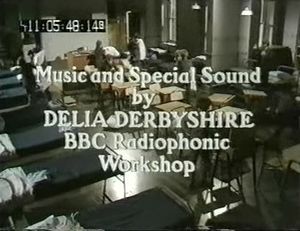
4th November 1971: O Fat White Woman is broadcast for the first time.
12th December 1971: Hogarth is broadcast for the first time.
1972
2nd April 1972: The first episode of Tutankhamun's Egypt is broadcast.
18th May 1972: Jeffery Boswall writes to Delia saying he is looking forward to meeting her 2pm Monday [the 22nd] to talk about Wildlife Safari to Argentina, show her the film, provide her with some sounds.[93]
19th May 1972: Jeffery Boswall writes to Delia sending her tapes of sounds for Wildlife Safari to the Argentine. In a footnote, JH sends passionate love to DD.[94]
22nd May 1972: Presumably, Delia meets with Jeffery Boswall in Stefan Pstrowski's office in TV Center at 2pm and in the afternoon they hear a tape of 60 sounds for Wildlife Safari to the Argentine.[93]
May 1972: Delia is given a six-month leave of absence from the BBC “to consider staying on at the BBC.”[95]
10-17th June 1972: Circle of Light is shown at the Cork Film Festival and wins the prize in the Short Film Art Section.
22nd June 1972: Delia plans an unidentified piece in 9 movements on the back of Tutankhamun's Egypt cue sheets.
25th August 1972: Delia's music for the Egypt item in Chronicle Magazine: Egypt, Rome and Britain is broadcast.
30th September 1972: Shadow of the Pharoah is broadcast.
November 1972: Delia checks out the last tape she will record for the BBC: TRW 7707 for Playback.
1973
In 1973, Delia leaves the BBC, joins Electrophon where she creates Living Lessons and music for the films The Legend of Hell House and Een Van Die Dagen.
7th March 1973: Paolozzi is broadcast on BBC Radio 4.
“something serious happened around '72, '73, '74. The world went out of tune with itself and the BBC went out of tune with itself.”[8]
“I still haven't worked out why I left - self preservation, I think.”[96]
“I eventually left [because] I didn't want to compromise my integrity any further. I was fed up having my stuff turned down [by the BBC] because it was too sophisticated, and yet it was lapped up when I played it to anyone outside the BBC. The BBC was very wary, increasingly being run by committees and accountants, and they seemed to be dead scared of anything that was a bit unusual.”[97]
From this moment on, at least until 1995, "nobody spoke of Derbyshire at the Radiophonic workshop. She was never mentioned."[98]
Delia and Brian Hodgson both leave the BBC to set up their own musical studio Electrophon.[3] but she soon quits and moves to Cumbria to work as a radio operator during the laying of a gas pipeline, then working and living with Li Yuan-chia at his Cumbrian home and art gallery, and living a private life.[7]
“The idea was that we were going to leave together and set up Electrophon,... she started dragging her heels about leaving. I left [and] blew my pension on setting up Electrophon. And Delia was supposed to come with me... we did “the Legend of Hell House” together, but she was not mentally there much. She'd get enthusiastic for a minute or two and then lose interest. So that was a difficult time. At that point, Delia almost “disappeared”. That then led on to her leaving London and going up north to work on the pipeline”[99]
She applied for the job at Laings “as soon as she saw the word ‘radio’ [in the advertisement]”.[100]
“I was the best radio operator Laing Pipelines ever had! I answered a job in the paper for a French speaking radio operator. I just had to sleep - everything was out of tune, so I went to the north of Cumbria. It was twelve miles south of the border. I had a lovely house built from stones from Hadrian's Wall. I was in charge of three transmitters in a disused quarry [delivering the weather forecast in French every night[7]]. I did not want to get involved in a big organisation again. I'd fled the BBC and I thought - oh, Laing's... a local family firm! Then I found this huge consortium between Laing's and these two French companies.”[8]
1974
30th November 1974: Delia marries David Hunter, labourer, and son of Ernest Hunter, coalminer;[101][102]
She told me she did it to make her socially acceptable. The women were wary of her on her own and she wanted to join the darts team. To her, it was a marriage of convenience. She thought it would be a friendship but they quickly discovered they weren't compatible and had a huge row. That was the end of that but she never divorced him.[103]
1975
In 1975 Delia creates music for a third art film About Bridges by Elsa Stansfield and Madelon Hooykaas.
1976
In 1976, Delia stops working for Laing as a Radio Operator on the laying of a gas pipeline between Scotland and Cumbria.[104]
When she left the BBC, she makes her way north up to the borders of Scotland and England and she settles in the village of Gilsland.[105]
1st March 1976: Glynis Jones of the BBC writes to Delia about renaming five of her tracks, originally for Travelling in Winter, The Bagman and The Naked Sun, for their inclusion on a library record of sound effects Out Of This World.[106]
[After the problematic marriage to Hunter] she moved several miles away from Gilton to the hamlet of Banks and lived at the LYC. She's there across 1976-1977 and she has to manage the place.[107]
1977
In 1977, Delia co-signs with Li Yuan-chia a copy of his Artist Book No.4.
1978
In 1978, Delia Derbyshire leaves Cumbria and returns to London, where she meets Clive Blackburn.[7][3]
1980s
In 1980, Delia creates a piano score for a 45-minute art film Two Houses by Elizabeth Cosmian.
January 1980: Delia buys a house in Northampton.[3]
May 1980: Clive Blackburn moves up from London to Northampton to join her.[3]
1983: Brian Hodgson, now director of the BBC Radiophonic Workshop, persuades her to visit the Workshop again. She does nothing but cry.[108]
1990s
Early 1993: Delia is interviewed by Austen Atkinson-Broadbelt for the Soundhouse article published in Doctor Who magazine on 12th May.
1993: Mark Ayres first gets in touch with Delia.[7]
January 1994: Delia's mother dies.[3]
1996: Drew Mulholland first makes contact with Delia.[109]
7 February 1997: John Baker dies. Shortly after, Delia goes to visit the companion of his final years, Daphne, at their home on the Isle of Wight and "became obsessed about the fire" that had damaged their home a year of two before.[110]
1997: Delia records the Radio Scotland interview from Northampton over an ISDN telephone link to John Cavanagh.
1997: Delia is diagnosed with breast cancer is later operated on.[7]
September 1998: Delia meets Sonic Boom for the first time.[111]
15 September 1998: Delia's husband, David William Hunter, dies in Haltwhistle, Northumberland.[112]
2-4 October 1998: Delia is a guest at the television memorabilia conference Panopticon '98 in Conventry, where she proudly sports a pink ribbon in support of breast cancer awareness.[7]
“She really enjoyed herself although... she was very nervous and very tearful,... slightly fragile”[113] “...when she got attention at the “Dr. Who” convention, she enjoyed it, after years of neglect”[114]
October 1998: A week before recording the Boazine interview, Delia is on the BBC programme Woman's Hour, speaking about her experience with breast cancer.[9]
October 1998: Delia is interviewed over the telephone by John Cavanagh for the Boazine interview.
December 1999: Delia is interviewed by Sonic Boom for Surface magazine.
2000s
In 2000 and 2001 she works with Sonic Boom as advisor/co-producer on the EAR LPs Vibrations and Continuum by long nightly phone calls 5 nights a week and visits to Rugby every Weds or Thurs on her 'private train', having realised that some trains went from Rugby to Northampton which were just returning and not scheduled.[115]
24 February 2000: She is interviewed by Jo Hutton for an article entitled Radiophonic Ladies.
Summer 2000: Delia records the track Synchrondipity Machine with Pete Kember at New Atlantis Studios in Rugby, England.[116]
Early 2001: Delia is working with Sonic Boom on MESMA (Multi-sensory Electronic Sounds, Music, and Art), an organization with the aim to hold workshops and festivals in order to increase knowledge of electronic music.[117]
Early 2001: Delia starts on a project to investigate the musical possibilities of shapeshifting alloys.[118]
10th June 2001: deliaderbyshire.com exists.
3rd July 2001: Delia dies at Northampton General Hospital of renal failure.[118] Her body was cremated and her ashes scattered.[119]
References
- ↑ 1.0 1.1 See Out of the Unknown.
- ↑ 2.0 2.1 The Dial a tune article republished in 2014 and dating the photo "Delia with pen" to 1965.
- ↑ 3.00 3.01 3.02 3.03 3.04 3.05 3.06 3.07 3.08 3.09 3.10 3.11 3.12 3.13 3.14 3.15 Clive Blackburn's About Delia
- ↑ 4.0 4.1 4.2 The 1970 newspaper article Morse code musician
- ↑ 5.0 5.1 5.2 5.3 5.4 5.5 5.6 5.7 5.8 The Soundhouse interview
- ↑ 6.0 6.1 6.2 6.3 Coventry Blitz on wikipedia.org
- ↑ 7.00 7.01 7.02 7.03 7.04 7.05 7.06 7.07 7.08 7.09 7.10 Breege Brennan's thesis
- ↑ 8.0 8.1 8.2 Delia in the Boazine interview.
- ↑ 9.0 9.1 The Boazine interview.
- ↑ Graham Harris' Delia Derbyshire: A Personal Tribute
- ↑ 7 Inch Cinema's Delia Archive Gallery, photo caption to Notes on Music
- ↑ 12.0 12.1 12.2 12.3 12.4 Graham Harris: Delia_Derbyshire:_A_Personal_Tribute.
- ↑ Personal communication from Jonathan Harvey's daughter.
- ↑ The NYO do not have membership records from the 1950's and are mainly able to determine when and if a musician was in NYO in the early years based on their being listed in their programmes. They have checked them all for this period and no Delias or Derbyshires appear. As Delia was born in May 1937, she would have been eligible to have been in NYO for some or all of 1950-1958. —personal communication from National Youth Orchestra of Great Britain.
- ↑ Expo 58 on wikipedia.org
- ↑ Personal communication from Jonathan Harvey's daughter, May 2017.
- ↑ Professor Chou Wen-chung, musical executor of the Varese estate, on Edgard Varese's "Poem Electronique" on furious.com
- ↑ Graham Harris, personal email.
- ↑ Delia in the Surface interview
- ↑ Clive Blackburn's About Delia.
- ↑ Delia, during the Radio Scotland interview tapes, quoted in The Delian Mode (film).
- ↑ 22.0 22.1 DD073220
- ↑ Dick Mills, interviewed for the 2010 film The Delian Mode.
- ↑ Dartington Hall
- ↑ 25.0 25.1 25.2 25.3 25.4 25.5 25.6 25.7 DD074527
- ↑ 26.0 26.1 26.2 26.3 DD074230: Delia's notes "R.W - 26.7.63"
- ↑ DD113202: Score for Science and Health dated "x.63".
- ↑ DD061's tape label.
- ↑ 29.00 29.01 29.02 29.03 29.04 29.05 29.06 29.07 29.08 29.09 29.10 29.11 29.12 29.13 29.14 29.15 29.16 29.17 29.18 29.19 29.20 29.21 29.22 29.23 29.24 29.25 29.26 The Radiophonic Workshop Tape catalogue's entry dates.
- ↑ DD112651
- ↑ Delia's papers for Rorate Coeli
- ↑ DD110042 DD110056
- ↑ 33.0 33.1 Special Sound, "day+of+radiophonics" p.110.
- ↑ Brian Hodgson, personal communication: "'The Magazine was Tatler, 12th May 1965. The article was by J. Roger Baker and photograph by Richard Swayne. I still have a copy of the magazine."
- ↑ 35.0 35.1 35.2 35.3 35.4 35.5 35.6 35.7 DD094630
- ↑ DD100029
- ↑ DD110122 DD110130
- ↑ 38.0 38.1 DD090120: Notes for Arnold Schwarzman's call signs
- ↑ 39.0 39.1 DD092820: Timesheet for Searching.
- ↑ The Wednesday Play: Ape and Essence on imdb.com
- ↑ Envelope_toDD1
- ↑ DD083450
- ↑ DD074801
- ↑ DD074812
- ↑ DD075926
- ↑ DD075824
- ↑ DD154505: Unit Delta Plus Concert of Electronic Music programme
- ↑ A Game of Chess - listening copy of final tape
- ↑ DD091236: An envelope dated 24th Oct 1966.
- ↑ DD082729: Draft program for the Brighton Festival, 10th Nov 1966.
- ↑ DD082346: Letter from Michael Leonard of Hornsey College of Art confirming the Brighton Festival, Dec 13th 1966.
- ↑ Brian Hodgson in the Guardian obituary.
- ↑ The Tape Library List's notes to TRW 6604.
- ↑ Personal email from Elaine Andrew, Morley College Learning Resources Centre Manager, August 2025.
- ↑ DD112601: Letter from Fred Willetts.
- ↑ Apologies: Letter from Mrs. H. Rapp of the BBC.
- ↑ DD080054
- ↑ DD084312
- ↑ DD095646: Letter from Arnold Schwartzman.
- ↑ DD100734: Telegram about Tiger Talks
- ↑ Brian Hodgson interviewed for Breege Brennan's thesis.
- ↑ David Vorhaus in the Sound On Sound article "David Vorhaus", February 2002
- ↑ DD080404
- ↑ DD111508
- ↑ Zinovieff's Red Bull Academy interview
- ↑ 66.0 66.1 DD111508
- ↑ DD100908
- ↑ DD100908: Notes for Who Is
- ↑ Work Is A 4-Letter Word on imdb.com
- ↑ DD081013
- ↑ 71.0 71.1 71.2 71.3 71.4 DD074113
- ↑ DD081333: Delia's notes for The Living World dated 30.10.68 "ROUGH MIX / NAKED SUN TAPE".
- ↑ DD080940: Memo fron Robina Gyle-Thimpson
- ↑ Special Sound, p.124.
- ↑ Special Sound, p.143
- ↑ DD164714
- ↑ DD165533
- ↑ DD165316
- ↑ The Surface interview
- ↑ DD141714
- ↑ Nicola McCartney cited in Breege Brennan's thesis.
- ↑ DD101950
- ↑ DD141636
- ↑ DD141601
- ↑ DD102148
- ↑ DD141844
- ↑ Brian Hodgson interviewed for Breege Brennan's thesis
- ↑ 88.0 88.1 DD110726
- ↑ 89.0 89.1 Special Sound, p.113.
- ↑ DD135529: Letter from Ewan Hooper to Kaleidophon thanking them for their work on Macbeth.
- ↑ Special Sound, p.134-5.
- ↑ DD134239
- ↑ 93.0 93.1 DD145728
- ↑ DD145530
- ↑ Programme notes to Standing Wave by Nicola McCartney, cited in Breege Brennan's thesis.
- ↑ Delia in the Radiophonic Ladies interview.
- ↑ Delia in the Surface interview, December 1999.
- ↑ Elizabeth Parker's email to Johann Merrich in the audio lecture Le Pioniere della Musica Elettronica on arwiki.org at 20:30.
- ↑ Brian Hodgson interviewed for Breege Brennan's thesis.
- ↑ John Cavanagh cited in Breege Brennan's thesis
- ↑ Delia's Oxford Dictionary of National Biography entry.
- ↑ The General Register Office for England and Wales' Register of Marriages, Northumberland West 1, Oct-Dec 1974, p.1761. (according to Wikipedia)
- ↑ Clive Blackburn in the Mail on Sunday article.
- ↑ Comment by user Tagginglaong on 19 Jul 2008: "I worked at Laing Pipelines during 1976 on the radio communications. What has this to do with Delia? Well she had been the previous incumbent of the job and I have to tell you she was mightily respected by all the engineers and crew from Scotland to Cumbria, both French and English. Everyone knew her as the woman who had been in the Radiophonic Workshop and most said she had written the Dr Who theme. I was told she took the job with Laings because she wanted a little space in her life. I can't vouch for her reasons, but I can vouch for how much her workmates thought of her. I'm sorry I never met her, but apparently she was pretty formidable."
- ↑ David Butler in These Machines Haven't Finished Yet at 43:39.
- ↑ DD073013
- ↑ David Butler in These Machines Haven't Finished Yet at 46:36.
- ↑ “I managed to get her onto a composer's desktop programme. But she couldn’t cope with it and spent most of the weekend in tears.”: Brian Hodgson interviewed for Breege Brennan's thesis.
- ↑ Variations on the Dr Who theme
- ↑ The John Baker Biography by Richard Anthony Baker at trunkrecords.com
- ↑ Delia in the Surface interview.
- ↑ David William Hunter on Family Search website
- ↑ Mark Ayres interviewed for Breege Brennan's thesis.
- ↑ Brian Hodgson interviewed for Breege Brennan's thesis.
- ↑ Sonic Boom, personal communication
- ↑ delia-derbyshire.org's News for 4th September 2003: New Delia Derbyshire Collaboration Released
- ↑ Andy Kellman's Artist Biography on www.allmusic.com
- ↑ 118.0 118.1 Delia's Oxford Dictionary of National Biography entry.
- ↑ [https://www.findagrave.com/memorial/120889397/delia-ann-derbyshire Delia Ann Derbyshire at findagrave.com
